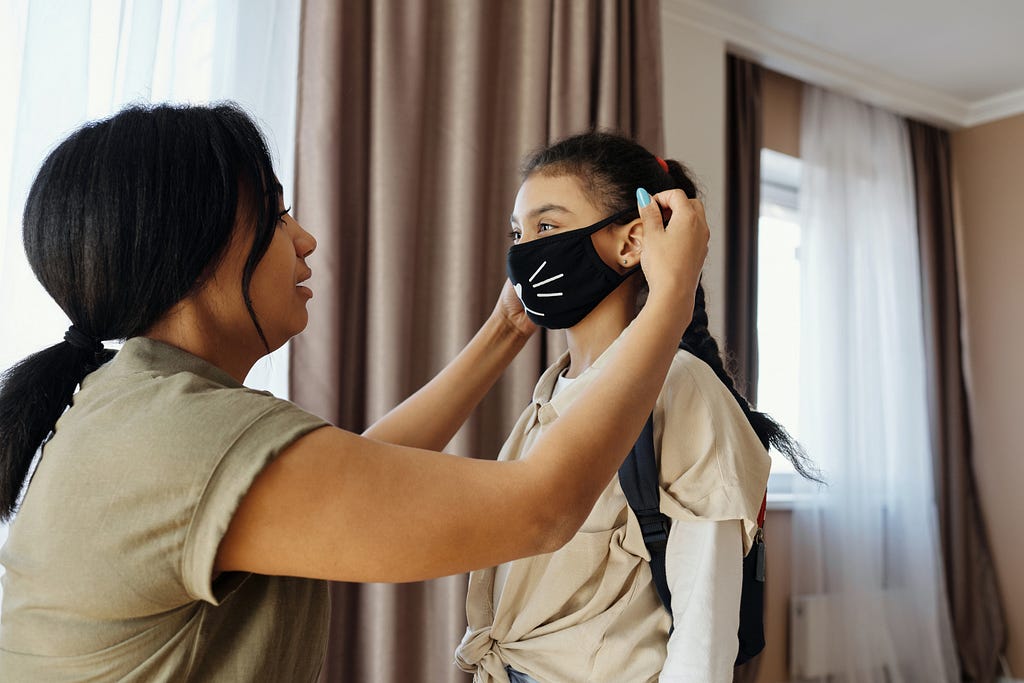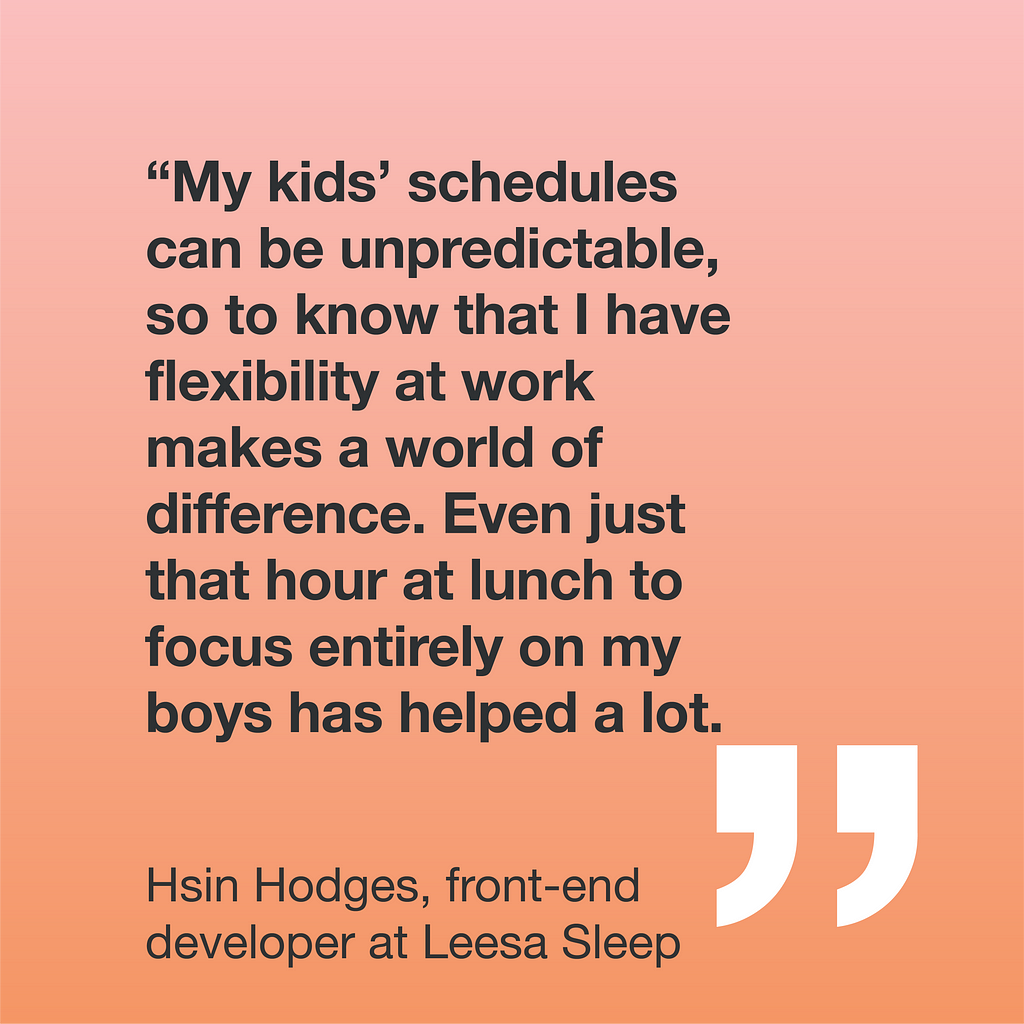With Workers as a Valued Stakeholder, B Corps Provide Flexibility and Support for Working Parents

COVID-19’s impacts range much deeper than the outbreak numbers, as nearly a third of the U.S. workforce has children at home. Many of those parents are, of course, also employees who must juggle work and family responsibilities that at times may seem impossible — especially for single parents, essential workers who cannot work remotely, and others with nontraditional schedules. A recent survey found that 13% of U.S. working parents have reduced their work hours or lost a job because of a lack of child care options. In Canada, emergency child care centers have opened to assist essential workers, but options for others are limited.
Household tasks add to the stress and worry: Women, who still typically handle most of the cleaning, shopping, child care, and other unpaid work that requires their time and energy, are at a higher risk than men of losing their jobs and careers as a result of the pandemic and closing of schools, daycares, and other child care options.
While these challenges have long-term implications and lack easy solutions, Certified B Corporations are adapting their practices and turning to their purpose-driven values for guidance as they help workers navigate these challenges. Businesses that do not adopt flexible schedules or family-centered policies are at risk of losing employees and facing burnout throughout an overtaxed workforce.
B The Change reached out on the B Hive, an online B Corp communications platform, for examples and learnings from the B Corp community that could serve as a guide for other businesses to support and retain their employees, including those most vulnerable.

Leesa Sleep: Remote Work Considerations to Prevent ‘Always-On Burnout’
While the COVID-19 pandemic means change and new challenges for all, Leesa Sleep CEO John Replogle says the company’s stakeholder-focused principles provide a solid foundation as guidance.
“Care for your team, and the team will care for your business,” he says. “If you start with caring for your people and get that right, most other things can figure themselves.”
Like workers at many other companies, the Leesa Sleep team members suddenly found themselves working remotely under stay-at-home orders and dependent on online meetings and emails for communication. A daily all-team Zoom meeting helps keep everyone in touch and provides an opportunity to share ideas or other feedback on current projects.
But Replogle says they noticed a need for some limits so workers can avoid always-on burnout. So the B Corp instituted an embargo on midday meetings that gives parents a break to make lunch, check in on homeschooling progress, or take care of other family commitments.
“As we were changing the way we were working, active communication was critical,” Replogle says. “It became apparent that a midday break would allow everyone to reset and take their eyes off their screen.”
This midday break also aligns with Leesa’s values as a company focused on health and well-being through better sleep, he says. “Sleep is intrinsically tied to wellness, and we want to be sure we tie wellness to our team. We have a hard-working team, and encourage employees to work when they can focus,” he says. “You’re most productive when you’re least distracted. If you don’t care for family issues first, it’s hard to care for the business.”

Team members at Leesa agree the flexibility has helped them and their families adjust. “My kids’ schedules can be unpredictable, so to know that I have flexibility at work makes a world of difference. Even just that hour at lunch to focus entirely on my boys has helped a lot,” says Hsin Hodges, a front-end developer.
Andy Cornelius, enterprise resource planning manager at Leesa, says the flexibility helps him prioritize work tasks while knowing he has time to spend on family also. “Having two children under 5 at home while both parents are working presents its challenges. Leesa is adapting by empowering us to have control of our schedules and routines. We’re more focused on the outcomes than on hours spent or meetings scheduled.”
Leesa also encourages workers to think about their holistic health through meditation breaks led by an employee who ran a yoga studio and now is a project manager at Leesa. With these health-minded practices and flexible scheduling, the Leesa team has proven to be more agile and responsive than ever, Replogle says.
“It’s been remarkable. The notion of a flexible calendar has allowed us to quickly get our team working and collaboration done at a different pace,” he says, noting that Leesa was able to respond to the potential urgent need for hospital beds by creating a new hospital bed kit and making it available within days. The team also developed and launched its new Studio by Leesa mattress within three months rather than the typical six to nine months, Replogle says.

Fors Marsh: Flexible Leave Policy to ‘Meet Employees Where They Are’
Fors Marsh Group (FMG), a Virginia-based B Corp that provides market research and consulting services, implemented a new flexible leave policy beginning in March that will continue at least through the end of the year, says CEO Ben Garthwaite.
“This policy asks employees to give their best, genuine effort to be flexible and creative in balancing the needs of work and life,” he says. “And if life doesn’t allow them to reach the normal hours per day or week, then we provide additional paid leave to meet the employees where they are.”
Garthwaite says dozens of employees have used the policy to adjust their schedules, ranging from a couple extra hours a week of leave to being off full time to care for family members in need.
“We also recognize our employees and their family members are dealing with significantly increased levels of stress and anxiety,” he says, adding this is especially true for those experiencing challenges related to substance misuse and co-occurring mental health complications. To address this need, FMG is providing all employees and their families with free and direct access to a credentialed mental health and substance misuse professional who provides confidential “safe space” support.
Related articles:
- Actionable Insights on Working and Learning Together in Times of Crisis: How the Pandemic Showed the Value of B Corps as a Community of Practice
- Why Many Purpose-Driven Businesses Are Faring Better During COVID-19: How Stakeholder Connections Can Strengthen Worker and Customer Commitments and Company Performance
- The Future of Work Is Now: How Stakeholder Engagement Model Supports All Workers: B Corps Model Ways Stakeholder Engagement Takes Care of Employees During and Beyond COVID-19
For more on how B Corps are adapting their policies and practices during COVID-19, see a longer version of this article posted by B Lab.
B The Change gathers and shares the voices from within the movement of people using business as a force for good and the community of Certified B Corporations. The opinions expressed do not necessarily reflect those of the nonprofit B Lab.

COVID-19 Business Response Keeps Families in Mind: B Corps Adapt by Adopting and Adjusting Policies was originally published in B The Change on Medium, where people are continuing the conversation by highlighting and responding to this story.